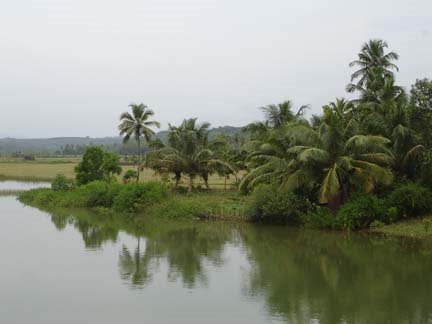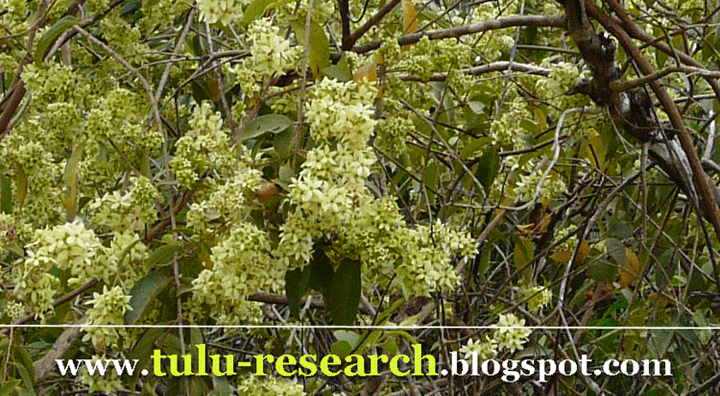The word ‘sangam’ means confluence of rivers in Indian languages. By usage, it also means an association (of people). The Sangam literatures in ancient Tamil have been benchmark documents for Dravidian socio-linguistic studies. The Tamil Sangam literatures were compiled originally by a group of poet-sages like the Vedas.
We have suggested in the previous posts that the immortal Tulu Siri pāDdana were created in the similar fashion by unknown and unsung Tulu Sangam poets. The word Sangam, normally attributed to Sanskrit, is analysed as ‘sam+gam’ or get together.
However, the real origin or source of the word Sangam could be a bit strange! Let us explore!
Migration of tribes
Human evolution and heritage are so obscure and complex that the origin, trail and trace of many of the common words may have been totally forgotten or misunderstood. Scientists have documented that anatomically modern human being originated and evovled in Africa and with passage of time human tribes later migrated to different continents.Migrating tribes from Africa during ca 60,000 years ago appear to be the earliest tribes to settle in southern India. One of the branches of human tribes that settled in East Asian countries known as Austro- Asiatic tribes, in another episode of migration, entered in India from the northeast and settled in different parts of India.
During the prolonged history of human evolution, human tribes settled in various continents developed and evolved independant languages, with the result we have several families of languages at present in the world. It is obvious that the earliest languages must have been simple sounds that evolved more or less independantly and developed grammatical complexities with passage of time.
Many question the basic and established tenets of human migration on the ground that the basic structure of languages in the place of origin and place of settlement are entirely different.It should be realized that many of these diverse sounding languages share common words that point towards common or shared origin of many of these languages.This could have been possible because the ancient words travelled to different continents along with migrating people rather than the languages and their grammatical structures.In some ways it also indirectly explains the resistance of the dominant native tribes vis-a vis invaders and immigrants.
We have explored in previous posts many of the African words surviving in our languages like Tulu as word fossils that document episodes of past history of human immigration. We shall explore some of the Austro-asiatic words that have been seamlessly absorbed in our languages.
Sangabettu to Sankala-kariya
Before we explore the possibe real origin of the common Indian word ‘Sangam’( the confluence of rivers), let us analyse some of the place names that are genetically related to this word such as Sangabettu, Sangolli, Sangli,Sankeshwar, Sankala-kariya etc. Infact there are numerous such village names all over India that carry the mysterious prefix ‘Sang’. (Sangner (Rajastan ), Sangariya (Rajastan), Sangareddy (Andhra Pradesh), Sangameshwar (Maharastra), Sangamner (Maharastra), Sangrur(Punjab) .. etc)
Sangabettu (Bantval taluk, Dakshina Kannada) is a village on the bank of river Phalguni (Gurupur) and is located on the Bantval- Mudabidri connecting road. The ‘bettu’ suffix in Sanga+bettu explains that it is a ‘bettu’ a hilly or elavated terrain.Sang prefix in the Sangabettu reminds us of ancient Buddhist or literary ‘Sangh’s. But also keep in mind the common factor ‘Sang’ in Sangam and Sangabettu.
Sangolli is a village in Belagaum District, Karnataka whereas Sangli is a place in Maharastra. The similar sounding Sangolli (Sang+olli) and Sangli (Sang+ (o)lli> Sangli) appear to be two regional variants of the same toponym, wherein ‘Oli’ or ‘Olli’ means a village.
Sangameshwar (Ratnagiri Dist. Mah) is situated at the confluence of Sonavi and Shastri Rivers.
Sangrur in Sangrur District of Punjab, historically first inhabited by people from Sindh and Baluchistan, supposedly around 2300 BC. However, the present Sangrur City is said to have been founded by one Sanghu, a Jatt, about 400 years ago.
Sangameshwar (Ratnagiri Dist. Mah) is situated at the confluence of Sonavi and Shastri Rivers.
Sangrur in Sangrur District of Punjab, historically first inhabited by people from Sindh and Baluchistan, supposedly around 2300 BC. However, the present Sangrur City is said to have been founded by one Sanghu, a Jatt, about 400 years ago.
Sankala-kariya (Mangalore Taluk, Dakshina Kannada) is a hamlet on the bank of River Shambavi (Mulki) on Kateel-Murukaveri- Mundkur-Belman stretch of road.The suffix ‘kariya’ represents a ferry point, whereas the prefix ‘Sankala’ appears a bit strange since ‘sankala’ means a chain. However after a perspective analysis we feel that this word was originally ‘Sang-kala’ rather than sankala. The word ‘kala’ (pronounced kaLa) means a field or a plot (usually devoted to Spirit worship in the antiquity ) as we seen in numerous place names like Aikala, Bekala,Par(a)kala, Mabukala etc,
The common prefix among the word Sangam and the village names of Sangabettu (Bantval taluk), Sangkala-kariya Mangalore Taluk, Sangolli (Belgaum district) and Sangli (Maharastra) obviously is the word ‘Sang’! And the common natural factor among these words is these are all physiographically related to or proximal to Rivers.
Thus, it is clear that these village names share the (prefix) mysterious word ‘sang’.Besides , all these villages are located on the banks of rivers.
Song, the River!
The mystery ends when you find that the Vietnamese word ‘Song’ means a river*. The original Austro-asiatic word ‘Song‘ has been adapted in India as Sang! It can be recalled that ancient Austro-Asiatic tribes entered India from the North east in the antiquity and with time spread and settled in different parts of India.The Austro-Asiatic word ‘Song’ (=river) has been assimilated seamlessly as ‘sang’ into Indian languages during the historical antiquity.
Sangam
Therefore, it appears that the word Sangam before it was adapted into various Indian languages was originally ‘songam’ or sang+am, the confluence of rivers or simply ‘rivers’ to begin with.
®
*Word Source: Keith Weller Taylor: “The Birth of Vietnam”. Google books.




Hi
ReplyDeleteNice blog
Some articles on Tulu
http://www.viswamurugu.com/tuluweb1.html
In Sangam Tamil Literature, there were many reference to Tulu, Tuluva people.
Thanks
Senthil
www.tamiladvt.blogspot.com